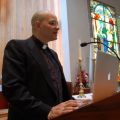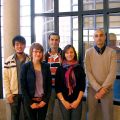Youth Speak News
“Please come to the altar to renew your vows with your wedding rings,” said our parish priest.
My parents looked at each other, and then to the rest of our extended family, with a mix of horror and amusement. It was their 20th wedding anniversary ceremony, and they forgot to bring their wedding rings.
In a flash, my aunt found an impromptu ring to fit my dad’s pinky finger, while I handed my mom my diamond gold ring. And like two teenagers up to no good, my mom and dad scurried up to the front of the church, laughing at the situation as they joined other couples from our parish.
Some of the couples celebrated their 10th anniversary, while one couple celebrated their 80th. The renewal of the vows ceremony was simple and beautiful. The couples posed for pictures and then celebrated with a delightful potluck lunch of sandwiches, a delicious wedding sheet cake and other desserts.
This heart-warming image is a stark contrast to the very popular world of reality TV weddings. The bride spends hours at a designer store trying to find the perfect princess dress for $10,000. This is followed by a trip to Cartier for the most ostentatious necklace to match the bedazzled 24-karat engagement ring. The bride and groom argue over the wedding cake, but the bride chooses the most lavish one. Then scenes of the reception hall filled with ice sculptures and martini bars transition back and forth with that of dancing guests. For the grand finale, a dollar sign with six or seven figures usually pops up. The unspoken rule: the higher the price tag, the more successful the wedding.
I learned more about celebrating love in the span of a two-hour renewal ceremony than the countless hours I have spent guiltily watching reality wedding shows. My mom glowed through the entire renewal ceremony, despite forgetting her wedding band. This completely contrasted with a reality TV bride who refused to walk into the church for two hours because the florist sent the wrong bouquet.
I love waking up in the morning and finding my parents sitting at the breakfast table casually talking and laughing. When they have an argument, they are eventually willing to forgive one another. Even with hectic schedules, they attend Mass every Sunday to celebrate and reflect on the life they share together.
Marriage is not perfect and it is definitely not simple. But they are committed to each other and to the vows they shared in front of God and their family 20 years ago. And their wedding cost only a fraction of the average reality TV wedding.
My mom can’t recall the location of her wedding dress. My dad’s wedding ring no longer fits. But the night my mom’s car had a flat tire in the pouring rain during Hurricane Sandy, my dad immediately stopped cooking dinner and drove to the rescue. He gave her a hand to hold, an umbrella to shield her from the storm and piece of mind that she would never be alone through any test God might send their way.
Study finds Catholic grads are like public counterparts
By Nathan Rumohr, Canadian Catholic NewsA recent study has reported that Catholic school graduates view the role of faith in the public square similarly to graduates of public schools.
Cardus, a Christian think tank that focuses on bringing faith into public life, conducted the study, called “A Rising Tide Lifts All Boats.” It covers grads from schools in all provinces except Quebec, which the report covers separately.
The study compares graduates now ages 24 to 39 from government-run public schools with grads in the same age group from various kinds of schools: Protestant private schools, non-religious private schools, religious home schools, Catholic separate schools (government-funded), and Catholic independent schools (private with some government subsidies). Catholic schools in B.C. are independent.
Graduates were compared on a wide range of topics in addition to religion. However the study gives little information about what their actual responses were; it just reports how other grads compared to grads from public schools.
In total, 1,868 graduates were surveyed. In addition, the results were controlled for family socioeconomic and religious background.
The study revealed some interesting facts about faith in the public square.
“What struck me the most was that Catholic schools were the same as public schools in many respects,” said Ray Pennings, the study’s project leader and the director of research at Cardus.
The study showed grads from both kinds of Catholic schools were less involved in volunteering their time with their congregations than grads from Protestant schools, religious home schools and public schools. But they scored the same as public-school grads on their views on the importance of religion in public life.
“You would have expected to find some spiritual differences, but they weren’t there (for Catholic grads),” Pennings said, “which is distinct from the Protestant schools, where we were getting measurable differences.”
Pennings added graduates from Protestant schools said their faith made an impact on their cultural engagement.
They gave more time to their church than Catholics, but were less political. Catholic-independent-school grads volunteered more than Catholic-separate-school and public-school grads outside their congregation, but were less politically engaged.
“I am surprised by the results,” said Doug Lauson, superintendent of the Catholic Independent Schools of the Vancouver Archdiocese (CISVA). He said he would have expected religious training provided by schools would have an effect on how students lived their faith after graduation.
But Lauson noted that the sample size for Catholic-independent-school grads was low.
“Only 23 were sampled from the whole of B.C., and I don’t know how many of those were from our diocese.”
However, he added, secularization in society is a factor not only for Catholic schools but for Protestant ones as well.
He said CISVA is looking at ways to address this issue with students.
“Young people are in a bit of a difficult situation, because in school they learn one set of values, and then they go to the shopping mall and they’re surrounded by a different set of values,” he said.
“Our graduates should be aware of the world out there and should be prepared to defend their faith in a world that is very secular, and where the practise of your faith is allowed but frowned upon.”
With regard to employment, the study showed grads from both types of Catholic schools were similar to public-school grads. All three groups obtained managerial occupations (managerial professionals, lawyers, scientists, architects and university teachers) at the same rate.
With regard to how workplaces are run, the three groups held the same views on ethics and efficiency.
Catholic independent grads scored well in post-secondary education. They came in second to non-religious independent grads in total years of education, but were more likely than any other grad in the study to have a university degree. They also scored the highest in obtaining masters degrees.
Lauson said CISVA schools always aim to prepare students for university.
“We general ly provide education to students to enter university if they choose to,” he said. “Our graduates are required to obtain more credits because we offer more subjects than government-run schools.”
He also said CISVA focuses on developing “skill sets” for students to learn for the 21st century. The Ministry of Education recently recognized them for their unique teaching methods.
The complete Cardus survey is at http://www.cardus.ca/research/education.
Groundbreaking at St. Thomas More
By Reagan Reese Seidler, Youth Speak NewsSASKATOON - St. Thomas More College, a Basilian-founded institution federated with the University of Saskatchewan, is expanding its walls to accommodate increasing enrolment.
The official groundbreaking of its three-storey, 12,000 square-foot expansion occurred mid-October. The $8-million project is designed to serve the varied and growing needs of its students.
New classroom and seminar spaces will move 75 per cent of the college’s classes inside its own walls. Currently, about half of STM classes are taught elsewhere on the University of Saskatchewan campus. At focus groups early in the design process, students said that classes located on-site allowed for a more comfortable atmosphere to discuss scholarly work from a Catholic point of view.
“This new building, our first major expansion in many years in spite of significant enrolment growth, ensures adequate classroom space to foster the nurturing scholarly learning environment for which STM is already well known,” said STM president Terry Downey.
“This new facility will enhance community for students, promote further opportunities for closer faculty-student and student-student academic engagement and ensure a continuation of the uniquely inspiring learning experience that is the STM academic tradition.”
In addition, new study, office and research spaces will give students a place to meet outside the classroom, while the construction of a large, indoor atrium offers a more social gathering place. The project follows through with a vision set out by Fr. George Smith, the Superior General of the Basilians and a former president of STM, who intended to make the college a second home for its students.
STM Students union president Desireé Steele is enthusiastic about the project.
“I look forward to welcoming friends into a building made hospitable to the different aspects of student life. More classrooms, study and lounge space means that more students will be able to enjoy learning at STM,” she said. “The increased opportunities for STM to explore and share the riches of our Catholic faith will no doubt broaden our interactions with our university and diocesan community, giving fuller realization to the Basilian mission which formed this institution.”
The expansion, to be finished in 2013, was recently put on the fast-track with two major donations. David and Karen Holst from Warman, Sask., and Allan Markin of Calgary have each contributed $500,000. The announcements were made in conjunction with the Oct. 15 groundbreaking. The project also received early commendation from the Catholic community, including support from the Saskatoon diocese and school board.
The donations coincide with another $1-million gift the college received earlier. Local philanthropists Les and Irene Dubé made the donation in support of STM’s parallel campaign to establish an endowed chair in Catholic Studies.
The chair will support scholarship in the area of Catholic Studies through teaching, research and ecumenical dialogue and be a source of intellectual leadership in the province’s Catholic community.
“STM is near and dear to our hearts,” said Irene Dubé. “We are strong believers in the importance of a college that encourages students to explore both faith and reason, and the chair in Catholic Studies will be a vital contributor to this environment.”
This is not the Dubés’ first donation of this magnitude. A previous $1-million donation was made in support of the college’s social justice program. To recognize their longstanding commitment to the college and its students, the chair will be named in their honour.
St. Thomas More College was founded in 1936 through an agreement between the University of Saskatchewan and the Basilians to provide Catholic education in the province. Since then, it has grown to house 40 tenure-track faculty members and more than 2,000 registered students.
Campus Catholic identity
By Reagan Reese Seidler, Youth Speak NewsLiberal arts students, when asked to describe what university life promises, would generally respond with a similar romantic concept: days spent learning new and radical ideas, afternoons debating conspiracy theories, nights at a postmodern art show.
Engineering students are less likely to identify with postmodern art shows, but are more likely to be proud of stories which make their workload seem i mp o s s i b l e . Students have their own sense of what it means to be part of their department. Whatever the particular narrative happens to be, students know it, are influenced by it and make it a part of their campus identity.
Even the reputation of a university, as a serious institute of research or as a party school, is developed on the ground and it can have a profound effect on a student’s university career.
So what kind of reputation, true or false, surrounds our nation’s Catholic colleges and universities?
Canada has at least 20 Catholic post-secondary institutions, many of which operate in close association with secular partners, such as St. Joseph’s College at the University of Alberta and St. Jerome’s University at the University of Waterloo. Without a purposeful effort to develop a unique identity, we are likely to revert to Catholic clichés of piousness or orthodoxy.
It is for this reason that my alma mater, St. Thomas More College at the University of Saskatchewan, set out over the last number of years to explore the meaning of its Catholic identity. Following extensive consultations with its students’ union and other stakeholders, STM has successfully integrated its legacy as a Basilian-founded college with the dynamic needs of a growing province. The Basilian belief that education is a means to achieve good, rather than an end in itself, grounds the educational philosophy of the college.
And in this world of financial austerity, the ability of Catholic colleges to differentiate themselves from secular institutions is necessary for their existence. Without providing something that their non-religious counterparts do not, it is hard to justify public funding for Catholic post-secondary institutions. But this has lead to a misguided strategy.
Rather than trying only to answer “what they do,” the focus of Catholic institutions must also be on “who they are.”
Generally, each has the ability to invoke the Church’s academic history as a source of its character, calling upon a tradition which views faith and reason as complementary components in scholarship. Then, incorporating the local oddities and traditions of every school, our colleges should be able to say definitively this is who we are.
The foremost goal of Catholic post-secondary institutions should include developing robust, local identities. It is also essential to their ongoing success to ask identity questions from a student-centric point of view. “What is unique about a person who studies here? What do they value?” With these thoughts in mind, our colleges can develop constructive and meaningful campus cultures, a process which goes a long way in meaningfully connecting students to their campus and community.
Artist couple glorifies God through art
By Marie Boston, Youth Speak NewsCALGARY - Newlyweds Christopher and Jacinta Pecora met in 2008 at a friend’s pork roast. They hit it off after discovering their mutual interest in art, and their common Catholic faith solidified the connection.
Chris is a graphic designer and Jacinta is a print maker. This past summer, the 25-year-olds were married, a union filled with a love of art and strengthened by their mutual God-given artistic talents.
Both grew up creating art and pursued these passions in post-secondary education. Chris studied graphic design at the University of Lethbridge and Jacinta studied fine arts at the University of Calgary.
Art is “part of who we are, it’s a similarity that we can share, along with our faith,” Jacinta said.
Now that they are young professionals, they have begun to use their talents for the good of others and the Church.
Chris recently started his own graphic design company. At Chris Pecora Graphic Design, his clients are as diverse as a bike shop in San Francisco to a coffee company in Calgary. He also has a number of Catholic clients. He designs posters, graphics and logos for clients such as the diocese of Calgary, Catholic Christian Outreach and Clearwater Academy, a private Catholic school in Calgary.
But Chris finds that many Catholic organizations don’t prioritize on graphic design, so he ensures that he brands his designs in such a way that they appeal to Catholics and non-Catholics alike. By creating posters, ads and web sites that look both artistic and modern, Chris is able to endow these organizations with a competitive edge. For example, he designed promotional posters for FaithLife Conferences that happen every two months in the Calgary diocese. These eye-catching posters show what the conference is about without a preachy feeling.
Chris attributes his success to God.
“I feel like God is allowing me to do this,” he said. “I trust that what I’m making is from God.”
Chris thanks divine inspiration for his work.
“(The idea) starts as something from me and then working through it, suddenly these things that are way smarter than me kind of just appear.”
Jacinta, instead of working with organizations, works with individuals. As a facilitator at Prospect, a human services organization in Calgary, she teaches adults with developmental disabilities different forms of art such as painting, printmaking, sculpture, photography and drawing. She is required to look for moments throughout the day to help teach her students life skills and set goals so they can eventually be employed.
Jacinta turns to the grace of God to help her be patient with the sometimes-challenging behaviours that her clients exhibit.
“It’s not a daily struggle for me to go through my day, whereas for some of them it’s a physical struggle or for some of them it’s a mental struggle,” she said.
In turn, her students teach her to be more appreciative of her life.
“I am grateful for what God has blessed me with,” she said.
In pursuing her own art, Jacinta allows God to inspire and direct her.
“I get really nervous every time I make something. Every new project is a little bit intimidating,” she said. So she prays. “If I didn’t, I would be so nervous I wouldn’t be able to do it.”
Jacinta’s medium is a traditional form of printmaking called etching. She creates art to express herself and experiences she has had.
The fact that both she and her husband are artists helps them to understand and encourage each other in a deeper way, with both their art and their faith.
Two years ago, Jacinta worked with the Sisters of Charity in Calcutta. They inspired her to create prints based on this experience, and Chris encouraged her with ideas on how to create significant art from this faith-based trip.
The couple also create art together to inspire others, and their collaboration brings them closer together. To a close friend of theirs who recently was ordained to the priesthood, Chris and Jacinta gave a quote from Pope Benedict XVI burnt into wood.
“It makes the whole process of creating less daunting just to know that I have someone I can talk to about these ideas,” Chris said, “because art is a very personal thing, you have to be vulnerable, but I have my wife and I can tell her.”
For both Christopher and Jacinta, the type of work they do is dictated by their faith.
“I’ve turned down work that is not in line with my faith, if what the client is asking me to do isn’t really congruent with my beliefs,” Chris said.
“We can have these discussions so that things that we create would never go against our morals, and we can support each other in that,” said Jacinta.
They are working in the world, but according to Jacinta their mutual understanding and faith “keeps us accountable and in check about how we want to live and have people see our work.”
They keep in mind the letter Pope John Paul II wrote to artists in 1999.
“(Our work) should always glorify God one way or another,” Chris said paraphrasing the Pope. “It is a positive, hopeful Catholic perspective.”
The letter also states that God created man and woman in His own image, for each other, and then sent them to create not only in the familial sense, but also in the other vocations they are called to. So through their work with Catholic and humanitarian organizations, Chris and Jacinta abide by John Paul II’s request to “not to waste this talent but to develop it, in order to put it at the service of their neighbour and of humanity as a whole.”
Leave busyness to the bees
By Emma Brown, Youth Speak NewsDo the laundry, finish research assignment, clean the kitchen, read chapters 10, 11 and 12, Skype Tessa, meet with my drama group, prep faith study and write my Youth Speak News column. This was my to-do list for one day.
I am chronically busy. If I ever lose my day planner, I don’t think I’ll be able to survive. Every hour of my day is accounted for by one commitment or another, and my situation is not unique.
Being busy seems like an inescapable part of being a young person today. I didn’t have to scroll very far down my Facebook news feed to find someone complaining about being “stressed.”
We’re a generation that “gets things done,” and society tells us that’s a good thing. Accomplish a lot. Keep moving. Don’t stop.
But what does God think?
While reading the Letter of James, I was struck by this verse: “In the midst of a busy life, they will wither away” (James 1:9).
Wither away? At first, I drew back from this verse. Maybe some other, weaker person might wither away, but not me. I have everything together. I may be busy, but I’m doing just fine.
I soon realized how wrong I was. While bussing home at 7 p.m. after a particularly busy day, my mind was filled with all the things I had to do that night. I was overwhelmed.
Then I felt the Lord gently prompting me to pray. He was asking me to set aside my list and spend an hour with Him first. He was saying to me what He had said to Martha when she was distracted by and frustrated with her hostess duties while her sister merely sat at the Lord’s feet: “You are worried and distracted by many things; there is need of only one thing” (Luke 10: 41).
So when I arrived home, although my “Martha duties” cried out for attention, I went to the Lord. In His arms, the burden of my many commitments didn’t seem so overwhelming. I was restored by His grace and love.
Chronic busyness is not His plan for me or for any of us. There’s a reason that old saying is “busy as a bee”; we, as humans, weren’t designed for that kind of life. He has something much better in store for us: a life of reliance on Him.
He showed me that I don’t need to accomplish more, I need to receive more; I don’t need to succeed more, I need to rely more.
This constant mindset of “get things done” is detrimental to our relationship with God. We often use our busyness as an excuse to shut Him out of our lives. Our other priorities, which are not bad in themselves, take precedence over Him. But He’s crying out for us.
The world tells us that we need to squeeze everything we can out of this life, but Jesus tells us that “only one thing” really matters: a relationship with Him. We need to rely on Jesus and let Him carry us.
In doing this, I have discovered the peace, joy and comfort of living a life in total reliance on God. Now, when I feel the weight of my responsibilities causing me to wither, I remind myself that God is with me and He’s ready to help.
So let’s approach the Lord in prayer and ask Him to help us live, not according to lists and calendars, but according to His Spirit within us.
(Brown, 19, is a second-year journalism student at Carleton University in Ottawa.)
Tech-savvy priest ‘sells’ Catholicism
By Tristan Bronca, Youth Speak NewsTHORNHILL, ONT. - A financial analyst turned priest, Fr. Mario Salvadori is marketing an unorthodox and unapologetic formula of evangelization — and youth are flocking to it.
Salvadori, the only priest at Thornhill’s St. Joseph the Worker parish, jokes that he has “more degrees than a thermometer.” He has a bachelor’s degree in computer science, a master’s degree in theology and a master’s in business administration. Before he was a priest, Salvadori was a businessman. In many ways, he still is.
“I used to be able to sell a glass of water to a drowning man,” he said. “Now I sell Jesus Christ.”
His congregation in this Toronto suburb seems to be buying it.
“The numbers speak for themselves,” said Vlad Mamaradlo, the lay minister Salvadori hired to work with youth. Mamaradlo said every Mass is standing room only. “Even the foyer is full.”
And in the five years since Salvadori joined the parish, he’s paid off a $1.3-million renovation and $600,000 more off the mortgage.
Salvadori’s success stems from his approach to Mass. For him, evangelization is no different than marketing. “It’s just a different word,” he said. He and Mamaradlo look at Catholicism as a product they are selling. Something that, they say, the Church has failed to sell.
“In society, people are given options,” Mamaradlo said, “so let’s give them options.”
What Salvadori has given them is a refreshing twist on the traditional Mass. When he ordered the church renovation back in 2009, he made sure it would accommodate his style for delivering just that.
“We’re competing against 60-inch TVs, iPods and every other stimulation that’s out there,” Mamaradlo said.
So, Salvadori brought the technology to Mass. Every homily, his laptop is plugged into the pulpit, at the ready to bring up a clip on the two huge screens on either side of him.
He invites guest speakers and tackles current and controversial topics that many priests tend to shy away from — topics that weigh heavily on everyday life. One homily he delivered in May included a clip of U.S. President Barack Obama speaking about gay marriage. That homily has collected more than 300 views on YouTube as have some of his other videos posted on the site.
There are other options too, opportunities to connect with the congregation outside the now lessthan-traditional construct of Mass. There are trips downtown to feed the homeless, youth groups, parish events, even retreats in the United States that young people can sign up for.
Mamaradlo’s role as a paid youth minister is rare in Canada. It is part of a model Salvadori discovered in the United States. Seventeen other people were interviewed, flying in from places like Montreal and Philadelphia, in hopes of landing the position.
In fact, Salvadori runs the entire parish based on the U.S. model. He was first exposed to it 18 years ago when he attended a conference in Steubenville, Ohio. “The first thing that stunned me was that they used video,” he said. “I remember thinking ‘Wow, you can do this in the Catholic Church?’ ”
When Salvadori came to St. Joseph with plans to use the technology, he was met with that same sense of uncertainty. Then, only days after ordering the renovation, the Pope spoke out in approval, advocating the use technology to evangelize youth.
The initial reluctance at the parish is not the only resistance he’s encountered. Salvadori is known for a direct and unbending approach to Catholicism that can sometimes be hard to swallow.
“Just look at some of the comments he’s got on YouTube,” Mamaradlo said.
For example, a few weeks ago Salvadori asked the entire congregation to call one MP to voice their support for an anti-abortion motion. When the motion was denied he called it a “sin of omission” and asked everyone who didn’t call to complete a penance.
Salvadori doesn’t shy away from this criticism — he welcomes it. When asked about this, his voice perked, as if he wasn’t the only priest in a parish who’d been running around all day before a 9:45 p.m. interview.
“Many words have been used to describe me, but nobody has ever used the ‘B’ word,” he said. In more than 15 years and after hundreds of good and bad e-mails from parishioners, no one has ever described a Mass with Salvadori as “boring.”
(Bronca, 21, is a fourth-year journalism student at Carleton University in Ottawa.)
Fogarty awards honour Ontario Catholic students of the year
By Ruane Remy, The Catholic RegisterTORONTO - In March of 2011, Toronto student Isabel Ng-Lai took part in a service trip to India, where she volunteered at two schools run by the Loreto Sisters. It was an eye-opening trip that also helped her to be named Mary Ward Catholic Secondary School’s Catholic student of the year.
Ng-Lai was one of the 100 Ontario students who was to be recognized Oct. 20 at the 29th Annual Patrick Fogarty Awards Dinner. The dinner celebrates students at each Ontario Catholic high school who provide “service to community, service to their Church, service to their parish and service to their parents,” said Michael Monk, executive secretary of the Catholic Education Foundation of Ontario, which sponsors the awards.
“We feel we need to recognize the good things that are going on in Catholic high schools,” said Monk.
Ng-Lai went to India for a month with Adventure Learning Experiences. She volunteered at Loreto Sealdah and Loreto Panighatta, where she learned about the local culture and students’ daily lives.
“I had the opportunity to teach English and art to class 3 and 4 students. They were an absolute joy to teach, very respectful and hardworking, which I think is a testament to what the Loreto Sisters are doing in their schools,” she said.
Of the 49 students under her tutelage, Ng-Lai recalls accompanying one student on her hour-long walk home from school.
“She told me that when she grew up, she wanted to be like me and volunteer abroad to help children in Africa. It was a pivotal moment in my life because I came to the realization that my actions could inspire others,” said Ng-Lai.
“Many of these students are street children or come from families who suffer from extreme poverty. I tried to pass on the message to my students that they can break the cycle of poverty through education. They should always strive to achieve their full potential.”
When Ng-Lai returned home, she and a friend founded the non-profit organization 1Focus that chooses a specific cause each year, alternating between international and local.
“Last year 1Focus raised $8,000 for Loreto Panighata,” she said. “The funds will help expand the educational system and provide the opportunity for underprivileged children to attend school on a full-time basis.”
This year, 1Focus is raising funds for two youth homeless shelters, Eva’s Initiatives and Pathway.
“One of the main things I learned from my trip is that children are the same everywhere, they need affection, love to play with their peers and are very curious. So if children are the same everywhere, then they should be given equal rights,” she said.
Ng-Lai is now a first year student at York University’s Schulich School of Business.
Chris Harrison is also among this year’s Fogarty Award winners. The Grade 12 student at Burlington, Ont.’s Corpus Christi Secondary School was recognized for his efforts at home and abroad. He has been an altar server since Grade 6 at St. Raphael’s parish, where he’s also served as a eucharistic minister. This year, he took part in his school’s Hope trip to the Dominican Republic.
“I’ve been to a lot of places,” said Harrison, “but that was definitely one of the best trips I’ve ever been on.”
Harrison recalls that the locals were strong in their faith.
“It’s nice to see the smiles everywhere, even though they had so much less than us,” he said. “It really brought you down to earth.”
At the awards dinner, the CEFO’s medal of honour was to be presented to Archbishop Paul- André Durocher. And the Michael Carty Awards, financial grants of up to $2,000 each, were to be presented to eight elementary and secondary schools for proposing “innovative and engaging programs or projects” in their Catholic school environment.
The dentist and the divine
By Darren Pereira, Youth Speak NewsDuring elementary school, my smile was a dental nightmare. The question was not whether I needed braces, but when I would get them. The answer to that was Grade 10. And although I was afraid and uncertain about how this would all play out, hindsight has shown me that dental treatment complemented my faith life.
As soon as I received my braces, I was slapped with a list of things that I could and could not eat, and habits I would have to pick up to make sure my teeth were taken care of properly. After appointments with my orthodontist, my teeth and mouth would ache for at least a few hours, sometimes for days. On top of that, I was told that I would have to wear braces — and all the rules and pain that came with them — for at least two years.
As time passed, luckily for me, things became easier to bear, and I began to notice that my dental work shared similarities with my faith. Sometimes people think that being Catholic restrains you because of all the different rules you’re asked to follow. I knew these rules were far from restraining; they were guiding principles that led me towards goodness and God, the greatest good. I realized that, like the commandments, the rules given to me with my braces were there for my benefit, to prevent me from hindering the treatment. Unless I followed them, the braces would leave scars or be ineffective.
I better understood St. Paul when he wrote, “You are not under law but under grace” (Rom 6:14). That’s not to say that we can disobey the commandments, but it means that by grace we can live a faithful life within the boundaries they set. Realizing this changed my prayer life, as I began to pray often for the grace to make certain good actions habitual.
Reflecting on the pain I sometimes felt because of my braces, I understood that suffering in my life ultimately made me a stronger person. Just as my teeth were only straightened after enduring pain, my virtues were tested and strengthened by trials and suffering. I could only trust in God’s wisdom during these times, and this trustful surrender to Divine Providence became a source of great peace for me.
Having braces also taught me that change comes slowly. It may have taken two years, but God definitely made my crooked teeth straight. As St. Francis de Sales said, “Have patience with all things, but chiefly have patience with yourself.” Growing in patience, in my prayer life, in my trust in God and in any virtue takes time to accomplish. I won’t be able to make good habits and positive change without a continual effort, but “Patience obtains all things,” said St. Teresa of Avila. “The crooked shall be made straight” (Lk 3:5) if we’re patient enough to let God straighten what needs straightening.
(Pereira, 17, is a Grade 12 student at Brebeuf College School in Toronto.)
Single Catholics connect through speed dating
By Lianne Milan Bernardo, Youth Speak NewsTORONTO - Faith Connections and the Newman Young Adult Ministry are co-hosting “A Date to Remember,” a Catholic speed dating event where single adults can gather and get to know one another.
Speed dating is an activity where participants spend four to five minutes chatting with a person before moving along to the next person. Organizers offer a list of suggested questions to help participants during each session.
Then participants use scorecards placed in envelopes to let organizers know with whom they wish to share their contact information.
Geared towards Catholic singles between the ages of 19 and 39, A Date to Remember draws people who are formerly and currently affiliated with the University of Toronto and the Newman Centre.
“We have young adults asking for an event like this so we try to include that yearly,” said Kelly Bourke, interim program director for Faith Connections, a branch of Fontbonne Ministries.
Both ministries are preparing to hold their third collaborated speed dating event on Oct. 27 at the Newman Centre. The first speed dating night was held last summer.
While there are many socials and mixers hosted by both ministries throughout the year, speed dating provides a special venue for single Catholics.
“It’s an opportunity for singles to help develop new friendships that could develop into something else,” said Gem Ofreneo from the Newman Young Adult Ministry.
Kevin Lo, 27, participated in A Date to Remember after learning about it from a Faith Connections newsletter.
“I was a bit hesitant at first because of its non-traditional approach for finding a potential spouse, but I decided to give it a try,” Lo said. “I thought it would be a good chance to meet some new people and, particularly, fellow young Catholics.”
Space is limited due to the size of the venue and organizers have had to turn people away in the past.
“During the first year it was easy to have women sign on right from the beginning when we advertised,” Bourke said. “(With) the men, there were still spaces in the final week. This year I see men and women signing up (from the start).”
“I had never attended a speed dating event before so I didn’t really know what to expect,” Lo said. “However, the event was well organized. The organizers and volunteers did a great job in making the participants feel welcome and comfortable.”
These events provide a friendly and low-pressure environment for participants.
“Men were saying that it takes the pressure off of asking someone for their phone number,” Ofreneo said.
While exclusive to Catholic singles, the dance that follows is open to all young adults. The dance also works as a fundraiser where proceeds will go to the two ministries to fund other activities such as Newman’s outreach programs.
The organizers aim not only to fulfill young adults’ requests for such events, but also to host them in a way that upholds Catholic values.
“Ultimately we say when it comes to something like speed dating... can we bring something there that allows a really healthy and faith-filled idea of meeting new people without perhaps the agenda of ‘Do they make my list?’ ” said Bourke.
She hopes participants will be “open to the possibilities of friendship (and) romance,” and will “be able to be open to truly meeting new people.”
“It’s core to our faith how we connect to other people as strangers, as friends or otherwise.”
Ofreneo encourages single young adults to attend, “but not with the goal in mind of getting a date right away, but to start new friendships and go from there and see where that goes.”
Lo recommends the event.
“Regardless of whether you find that special someone, there is a chance that you may develop many new friendships,” he said.
Lo advises participants to keep an open mind and to pray before and after the event.
“View all ‘dates’ and potential matches as brothers and sisters in Christ,” Lo said. “Be yourself, have fun and smile.”
(Bernardo, 26, lives in Toronto, Ont.)
University receives federal funds for religious diversity project
By Ruane Remy, The Catholic Register(CORRECTION 24/10/12 to Michael Taylor's job title)
TORONTO - Citizenship and Immigration Canada has granted half-a-million dollars over three years to the University of Toronto for its Religious Diversity Youth Leadership project.
Launched in late September, the program investigates and acts upon the problems and possibilities of living in a religiously diverse society.
“The most important thing the CIC funding was looking for was the kind of projects that would bring together communities that wouldn’t normally be talking to each other,” said Pamela Klassen, professor in the Department for the Study of Religion and director of the Religion in the Public Sphere Initiative.
The project promises to bring together and build networks of communication between students, faculty, community leaders and youth in the Greater Toronto Area. It is run by the U of T’s Multi-Faith Centre for Spiritual Study and Practice, the Religion in the Public Sphere Initiative and the Centre for Community Partnerships. The project aims to raise awareness on how religious diversity and civic responsibility are connected and to work against exclusion and marginalization.
“We put in a proposal, the RPS, together with the Centre for Community Partnerships and the Multi-Faith Centre that was focussed on a university-based project that would take students out into the community and bring various community organizations in contact with students and with the wider university,” Klassen said.
The project has three main activities. The religious diversity youth training activity will have U of T students enrolled in a service-learning certificate program, which is meant to prepare them for serving in diverse communities, including religious communities.
In the next category of activity, academic and service-learning community partnerships, young adults will work in community organizations or university departments to see first-hand how civic responsibility and religious diversity play out in real-world situations.
“Just as our society becomes more diverse, our responses to spiritual and religious care should evolve with it,” said panelist Michael A. Taylor, Regional Manager with the Ontario Multifaith Council and a mental health professional. “A nation that accepts diversity should accept the entire diversity of a person.”
The third category of activity is the public forums and community research workshops. This connects policy makers, scholars, community leaders, practitioners and students.
The first forum was held on Sept. 27, the day the project launched. Titled “Care of Souls and the Soul of Care,” the forum lasted two days and was held to discuss the successes and failures of religion in publicly funded health care and the challenges religious diversity poses for biomedical health care.
On day two of the forum, the community research workshop brought together palliative care doctors, neonatologists, nurses, executives, hospital chaplains, scholars and students.
“What happens when a young baby dies in an ICU in the hospital and it’s a Muslim baby and the parents don’t want to wash the body, but the nurse thinks the body must absolutely be washed,” said Klassen, recalling the events of the workshop. “How do they negotiate those very emotionally fraught kinds of questions and understand what kinds of compromises the health care system can and cannot make to accommodate religious concerns?”
Future forums will address gender and sexuality in religious communities, youth violence and religious identity, as well as religion and the arts.











